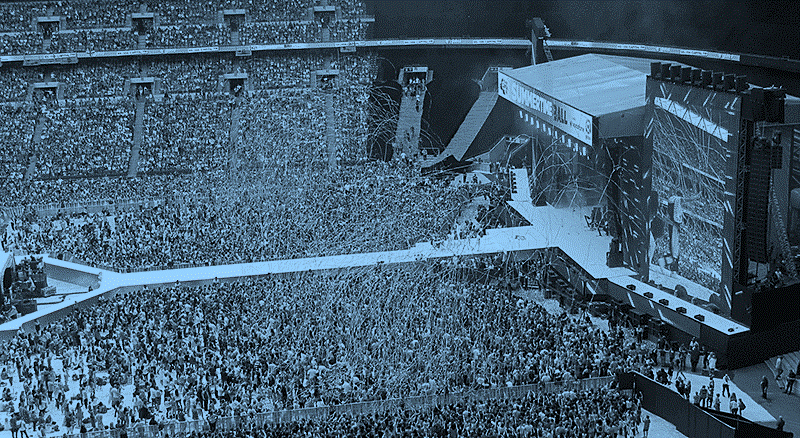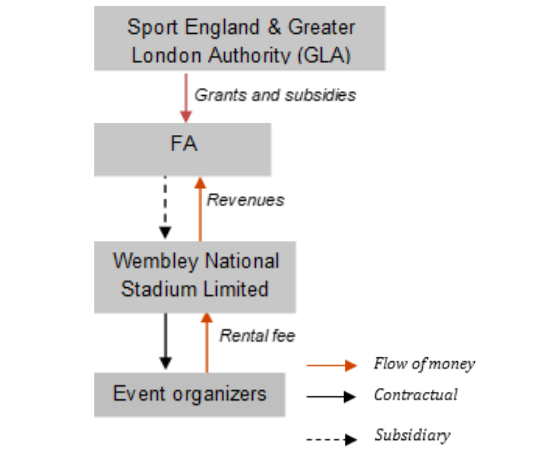Events in Wembley Stadium, UK

Photo Credit: Image by Freepik
On this page: Lessons learned on the usage of facilities during off-hours or off-seasons. Find case studies below, or visit the Guidelines on Innovative Revenues for Infrastructure section.
Project Summary: Background Cities across Europe are using festivals and events to achieve place marketing and economic development objectives and encourage cultural engagement and social cohesion. As a result, people are seeing more park concerts, festivals, competitions, and bazaars in public facilities. Wembley Football Stadium (Wembley Stadium) in London which is traditionally used for seasonal sporting events like Football Association (FA) Cup is being rented to event organizers for mega-events and concerts during off-season. Project Structure Wembley Stadium hosts major football matches, including home matches of the England national football team and the FA Cup Final. The £326.5 million government-funded Stadium is crowned by the 134-meter-high Wembley Arch, which serves aesthetically as a landmark across London. With 90,000 seats, it is the largest stadium in the UK and the second-largest stadium in Europe. Wembley Stadium is regularly used for English football games, mainly the FA cup. However, during off-season, the space hosts concerts and events of big acts that draw a high number of visitors from overseas who tend to extend their stay in England resulting in higher tourist spending associated with these events. The rebuilding of the Wembley Stadium transformed the local area of Brent with investments in public infrastructure such as £70 million for road, rail and pedestrian routes to prepare the existing infrastructure for influx of fans on event days. Apart from that WNSL also promote and support local community projects.1 Concert crowd at Wembley Stadium 2 What sets it apart? Amenities and connectivity The Stadium has a range of hospitality spaces that allow 10,000 people to dine before a match. These facilities are also designed to be used on non-match days for conferences, dinners, and other events. The new Stadium has revitalized the London Borough of Brent, with upgraded public transport links encouraging match-day arrivals and benefitting local residents and businesses. Up to 1,800 people visit the area daily on the famous Wembley Stadium tour. Key players for delivering improved services Wembley National Stadium Limited (WNSL) which operates the Wembley Stadium is wholly-owned by The Football Association (FA), a governing body for football in England. Sport England leads the development of sport in England and administers funding for sports from the National Lottery of England from which a £120 million Lottery Grant funded the purchase of the old Wembley Stadium. The London Development Authority (LDA), the regional development authority for London, which was dissolved in 2012, has contributed £21 million to the rehabilitation of the Wembley Stadium. Mechanism/s for Maximizing Funding for Infrastructure During the 2017/18 season, the FA generated record revenue of £376m (USD 445.7m) from The Football Association Limited, Wembley National Stadium Limited, and the National Football Centre Limited. The FA has invested back a record £128m (USD 151.7m) invested back into football. For example, on The FA’s Full-Time mobile app which has been a game-changer for grassroots football, making the management of teams much more efficient and effective.3 The 2017/18 season was the busiest year to date at the Wembley Stadium with 58 events and over 4 million spectators hosted including sporting events and concerts of big acts such as Ed Sheeran and Taylor Swift.4 In 2019, Wembley Stadium hosted more concerts than ever (a total of 38 shows) with a total gross of USD 102.2m. Among other acts to host big concerts, BTS grossed USD 13.5 million, and the Spice Girls grossed USD 27.3 million. Along with sold out concerts, the new hospitality facilities including F&B improvements also sold strongly.5 Typical Business Model Lessons Learned Managing the risks Footnote 1: Wembley Stadium Local Community Footnote 2: Wembley concerts boost record FA revenue Footnote 3: A record £128M has been invested back into every level of football Footnote 5: Wembley Stadium reports successful year of concerts in 2019

Sport England
Responsible for sports events and lifestyle in the UK
London Development Agency
Economic development body, promoting economic renewal and development
FA
Responsible for the core services
Wembley National Stadium Limited
The asset owner rents the space to event organizers
Event organizers
Organize events, sell tickets, and promote the events
The Guidelines on Innovative Revenues for Infrastructure (IRI) is intended to be a living document and will be reviewed at regular intervals. They have not been prepared with any specific transaction in mind and are meant to serve only as general guidance. It is therefore critical that the Guidelines be reviewed and adapted for specific transactions.
To find more, visit the Innovative Revenues for Infrastructure section and the Content Outline, or Download the Full Report. For feedback on the content of this section of the website or suggestions for links or materials that could be included, please contact the Public-Private Partnership Resource Center at ppp@worldbank.org.
TABLE OF CONTENTS
I. Innovative Revenues for Infrastructure (IRI)
2. Introduction to Commercial Value Capture (CVC)
3. Applying CVC in Infrastructure Projects
2. Case Studies in CVC from International Experiences
3.100 Case Studies: Municipal PPP Framework
Related Content
Select WBG PPP Toolkits
Featured Section Links
Additional Resources
Climate-Smart PPPs
Finance Structures for PPP
Type of ResourceFinancing and Risk Mitigation